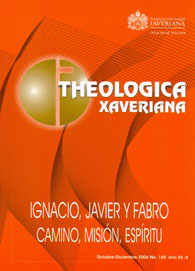Abstract
This paper looks at the gigantic turn experienced by Francis Xavier: from university student to universal man. He came to the Sorbonne University with the intention of becoming a scholar and to prepare himself for a career, probably an ecclesiastical one, desiring to recover the fame of his name and the honor of his family, humiliated by the defeat and the loss of autonomy of the Kingdom of Navarre. His openminded character, his brilliant intelligence, his passionate personality gave a strong impulse to his project. Ignatius of Loyola came across his life, who progressively opened his mind to more universal horizons and kindled his heart with the ideal of following Christ through a total identification with him. Xavier directed the whole strength of his being, through the experience of the Exercises, and especially through the meditation of the Eternal King, to the conquest of the most remote, most different, most forgotten peoples for the Gospel. He opened to the Church the cultures of the East and died exhausted by this immense endeavor.
This journal is registered under a Creative Commons Attribution 4.0 International Public License. Thus, this work may be reproduced, distributed, and publicly shared in digital format, as long as the names of the authors and Pontificia Universidad Javeriana are acknowledged. Others are allowed to quote, adapt, transform, auto-archive, republish, and create based on this material, for any purpose (even commercial ones), provided the authorship is duly acknowledged, a link to the original work is provided, and it is specified if changes have been made. Pontificia Universidad Javeriana does not hold the rights of published works and the authors are solely responsible for the contents of their works; they keep the moral, intellectual, privacy, and publicity rights.
Approving the intervention of the work (review, copy-editing, translation, layout) and the following outreach, are granted through an use license and not through an assignment of rights. This means the journal and Pontificia Universidad Javeriana cannot be held responsible for any ethical malpractice by the authors. As a consequence of the protection granted by the use license, the journal is not required to publish recantations or modify information already published, unless the errata stems from the editorial management process. Publishing contents in this journal does not generate royalties for contributors.


